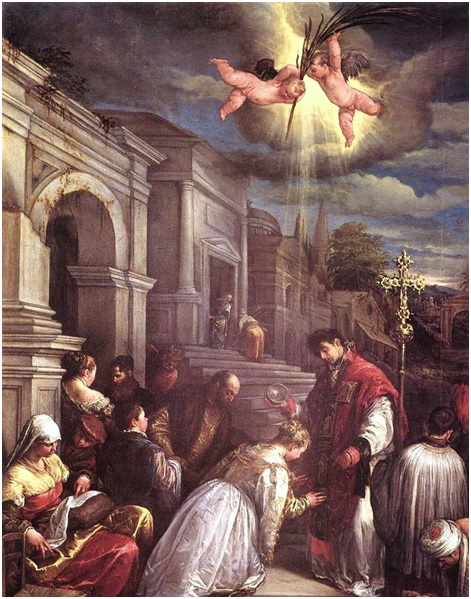The virtue of Father Valentine, who became Saint Valentine after his martyrdom, was glorious and his reputation was so resonant in the city of Rome that it came to the knowledge of the pagan Emperor Claudius II.
Feeling the order of his empire threatened by the pious Christian teachings of the saint person, the emperor arrested the holy man and after keeping him in jail for two days, in chains, he sent him to appear before his court for questioning him.
He asked him, first, in an obliging tone of voice: “Why, Valentine, you do not want to enjoy our friendship, and why you want to be friend with our enemies?”
But Valentine generously answered: “Lord, if you knew the gift of God, you’d be happy so as your empire; you would reject the worship that you render to the impure spirits and their idols that you venerate, and you would know that there is only One God who created heaven and earth, and that Jesus Christ is His Unique Son.”
One of the judges spoke and asked the Martyr about what he was thinking of the gods Jupiter and Mercury.
Valentine answered: “They are miserable persons who give the bad example of wasting the entire life uselessly in luxury and material pleasures.”
Thereupon, the judge who was interviewing him exclaimed that Valentine had blasphemed against the gods and against the governors of the empire.
However, the saint man kept talking to the emperor who was willingly listening to him and seemed to want to be educated of the true religion.
Valentine exhorted the emperor to repent for the Christian blood he had shed, asking him to believe in Jesus Christ and to be baptized, because it would give him a way to be saved, to expand his empire and to achieve great victories over its enemies.
The emperor, who already started to be persuaded, said to those who were surrounding him: “Listen to the holy doctrine that teaches us this man!”
But the prefect of the city immediately exclaimed: “Do you see how he seduces our prince! Are we going to abandon the religion that our fathers taught us?”
The emperor, fearing that these words may cause any disturbance or sedition in the city, left the martyr to the prefect, who put him, at even, between the hands of the judge to be examined and punished as a sacrilegious.
The judge led the prisoner, first, to his house.
When Valentine came in, he raised his heart to heaven and prayed God to enlighten those who were walking in the darkness of the Gentile world, by letting them know Jesus Christ, the true light of the world.
The judge, who was listening to his prayer, said to Valentine: “I admire so much your prudence, but how can you say that Jesus Christ is the true light?”
Valentine replayed: “He is not only the true light, but also the only light that enlightens every man coming into this world.”
The judge said: “If this is so, I will be soon testing it: I have a little adopted daughter who is blind since two years; if you can heal and restore her sight, I will believe that Jesus Christ is the true light of the world and that he is God, and I’ll do anything you want.”
The young girl was, then, taken to the martyr who, putting his hand over her eyes, prayed: “Lord Jesus Christ, who is the true light, enlighten your servant.”
At these words, the girl immediately recovered the sight, and the judge and his wife threw themselves at the feet of their benefactor, imploring him, as they had obtained by his favour the knowledge of Jesus Christ, to tell them what they should do to be saved.
The Saint asked them to destroy all the idols they had, to fast for three days, to forgive all those who had offended them, and finally to be baptized, assuring them that, by these means, they will be saved.
The judge did all what had been asked from him, freed the Christians that he was keeping prisoners, and was baptized with his entire family of forty-six persons.
The emperor, informed of this change, feared a sedition in Rome and, for reasons of State, he captured the judge and all those who were baptized, then put them to death by various sorts of torments.
For Valentine, the father and the spiritual guide of these blessed children and disciples, after having been placed for a long time in a narrow prison cell, he was beaten and his bones were broke with gnarled sticks.
The 14th of February 268, Valentine was, finally, decapitated on the Via Flaminia, where Pope John Ist (470-526) built a church, in the sixth century, under the invocation of the Saint near Ponte Mole.
Time transformed his name, Valentine, into synonymous of love and the memory of his martyrdom became the Feast of Love that the entire world celebrates until our days, even if most of the people ignore its origins and evolution over the history.
Saint Valentine is also called «the Illustrious Martyr».
He is sometimes represented:
1. holding a sword and a palm branch, symbols of his martyrdom;
2. or healing with his prayer the daughter of the judge.
However, the event of healing the young girl and also his name Valentine, which is a combination meaning health and vigour, explain partially the reason for which the fiancés, the young people who intend to marry, those who fear the attacks of the plague, and finally people who are prone to epilepsy and fainting were placed under his patronage.
Besides, during his lifetime, he was strongly opposed to the laws of the Roman Empire forbidding, under Claudius II, the marriage of the young men in order to save their force and vigor to serve in the ranks of the army and defend the threatened integrity of the Roman territory in a tumultuous era of the history of the empire.
Turning his back to the inhuman military regulations of his time, Saint Valentine spent his life encouraging the true love between people, the one that is crowned by the Christian Marriage where the two lovers give themselves, unreservedly, to each other in a pure and holy union, as the one that unites God with his beloved Humanity.
In all his actions and deeds, Saint Valentine was only loyal to his vocation of Christian priest serving his God with great passion and devotion without being the least worry about the threats and sanctions that he was subject to.
Many centuries after his death, Valentine was canonized in honour of his sacrifice for love.
The memory of his martyrdom, that became the Saint Valentine’s Day, came to counter the Lupercalia, pagan feast celebrating the fertility and dedicated to Lupercus, god of flocks and shepherds, and to Juno, woman protector of women and the Roman marriage.
The most significant event of these pagan celebrations was «the race of Luperci» where half naked men were pursuing women and struck them with strips of goat skin, the beatings received were perceived as ensuring fertility and happy pregnancy to them.
Furthermore, it is pretended that the Valentine’s Day coincides, in certain climates, with the mating season of birds.
Research and writing by
Amal M. Ragheb
(Carmen Aprahamyan)
International Journalist and Writer












